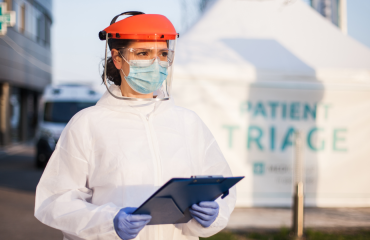Wearable Fitness Trackers Could Detect COVID Before You Do – WebMD
Nov. 30, 2021 — Your smartwatch or fitness tracker lets you know how many steps you’ve taken, how much sleep you got, and what your peak heart rate was during that morning workout. What if it could tell you when you’ve been infected with COVID-19 before you notice any symptoms?
That’s exactly what a group of researchers hoped would happen when they tested a real-time COVID-19 infection alerting system that relied on the data that smartwatches and activity monitor wearables can collect. The system they built detected 80% of pre-symptomatic and asymptomatic infections, according to a recent study published in Nature Medicine.
The study involved more than 3,300 adults ages 18-80 who installed the researchers’ app, called MyPHD, on their Android or Apple devices. The app collected data from the wearables they already had and transferred it to a secure cloud server where the researchers could analyze the data. The wearables included Fitbits, Apple Watches, Garmin devices, and other gadgets that were compatible with either Apple’s HealthKit or the Google Fit platforms.
The scientists used an algorithm to look for variations in participants’ step count, heart rate, and sleep patterns. If the algorithm detected a measurement outside the expected normal range that suggested a physical stressor, it sent an alert to the wearer. Participants who received an alert then answered several questions about whether they took a COVID-19 test, their activity level, any symptoms, medications, and vaccination status. The app did not make any medical recommendations about isolating or getting tested.
During the study, from November 2020 through July 2021, more than 2,100 participants received daily real-time alerts, and more than 2,100 completed at least one survey. Of the 278 people who reported receiving a positive COVID-19 test, 84 participants (all wearing a Fitbit or Apple Watch) had enough data around the time they had an infection for them to receive alerts.
Three Days Ahead
Sixty-seven of these people received alerts suggesting the potential for infection. The alerts detected an abnormal reading a median 3 days before the person developed symptoms.
Alert signals were even linked to 14 of the 18 cases involving a positive test result but no symptoms. Further, the algorithm could detect physical changes people had as a result of receiving a COVID-19 vaccine.
Despite the app’s success in identifying abnormal readings linked to infections, plenty of alerts went out that were not linked to infections.
“Most of the annotated alerts can be attributed to other events, such as poor sleep, stress, alcohol consumption, intense exercise, travel or other activities,” the researchers pointed out.
But those are also situations where the person likely already knows why the reading was abnormal, so they wouldn’t be alarmed that they might have an infection, the authors suggested. Though the study lasted less than a year, the participants said they did not get tired of the alerts. The researchers plan to fine-tune their app to let users adjust the sensitivity of readings that trigger an alert.
Nature Medicine: “Real-time alerting system for COVID-19 and other stress events using wearable data.”
© 2005 – 2021 WebMD LLC. All rights reserved.
WebMD does not provide medical advice, diagnosis or treatment.
See additional information.




